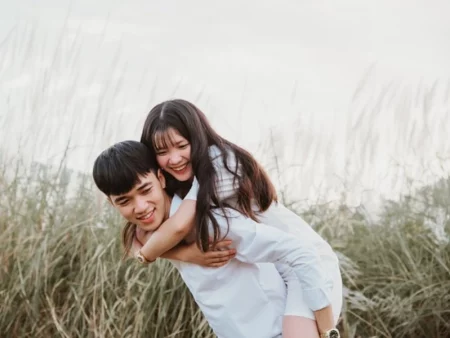Understanding the Friendzone Phenomenon
The “friendzone” after sleeping together presents a complex emotional landscape, where physical intimacy fails to bridge the gap to a romantic relationship. This phenomenon often occurs when one person views the encounter as a gateway to deeper connection, while the other sees it as a temporary exploration or a fling.
Several factors contribute to this post-intimacy friendzoning:
- Misaligned expectations: One party may seek commitment, while the other desires casual encounters
- Emotional withdrawal: Fear of vulnerability can lead to emotional distancing
- Compatibility issues: Physical chemistry doesn’t always translate to romantic compatibility
- Timing discrepancies: Life circumstances may not align for a serious relationship
- Communication breakdown: Lack of open dialogue about intentions and feelings
- Differing levels of attachment: One person may develop deeper feelings more quickly
- Past experiences: Previous heartbreak or trust issues can influence current behavior
The psychological aspects of being friendzoned after sex can be particularly challenging. People often feel a sense of betrayed trust or disappointment, grappling with vulnerability and potential heartbreak. This situation can spark intense emotions, including regret, longing, and a desire for closure.
Navigating this awkward terrain requires setting clear boundaries and managing expectations. Friends who have shared intimacy may find themselves in a delicate balance, trying to preserve their platonic bond while processing complex feelings. Some may experience a persistent yearning for more, while others might seek emotional distance to protect themselves.
Understanding this phenomenon is crucial for both girls and guys who find themselves friend-zoned after intimate encounters. It highlights the importance of clear communication, emotional intelligence, and mutual respect in all interactions, especially those involving physical intimacy. Being hesitant to express true feelings or desires can lead to misunderstandings and emotional turmoil.
Emotional Impact of Being Friendzoned After Intimacy
The aftermath of physical closeness followed by unexpected distancing can unleash a whirlwind of emotions. Many people find themselves grappling with shock, as if the ground beneath them has suddenly shifted. The contrast between shared moments and subsequent detachment can be jarring, leaving one adrift in conflicting sentiments.
Initially, a profound sense of bewilderment may set in. The mind races to reconcile the disconnect, often leading to self-doubt and questioning one’s judgment. This cognitive dissonance can be particularly challenging, as individuals struggle to make sense of contradictory signals.
As reality sinks in, feelings of inadequacy may surface. One might wonder if they weren’t good enough or worthy of a deeper connection. This self-criticism can erode self-esteem and confidence in future romantic endeavors.
The experience may also trigger a fear of attachment, making individuals hesitant to open up in future relationships. This fear can lead to emotional walls being built, potentially hindering future connections.
Navigating the emotional landscape after unexpected distancing requires a delicate balance of self-compassion and honest reflection. Acknowledge your feelings without judgment, while recognizing that another person’s actions often reflect their own journey rather than your worth.
Processing these emotions often involves grieving for the potential relationship that didn’t materialize. This grief can manifest as sadness, anger, or even relief, depending on individual perspectives and desires.
It’s essential to recognize that healing is non-linear. Some days may bring clarity and acceptance, while others might reignite confusion or longing. Embracing this emotional ebb and flow is crucial for growth.
Setting clear boundaries becomes paramount. Establishing limits on physical and emotional affection can help prevent further hurt and provide a framework for moving forward, whether as acquaintances or separate individuals. This process of self-discovery and healing after being unexpectedly distanced can ultimately lead to personal growth and resilience in future relationships.
Communication Strategies for Clarity
Navigating the aftermath of an unexpected shift in your relationship dynamics requires a delicate balance of honesty and respect. When seeking clarity, timing is crucial. Allow both parties a brief period to process their thoughts and emotions before initiating a conversation. This pause can lead to more productive dialogue.
When you’re ready to talk, choose a neutral setting where both people feel comfortable expressing themselves openly. Begin by acknowledging the shared experience and your desire for mutual understanding. Use “I” statements to express your feelings without placing blame, such as “I felt confused by the change in our dynamic” rather than “You led me on.”
Listen actively to your friend’s perspective without interrupting. Their viewpoint may offer valuable insights into their decision-making process. Be prepared for potentially uncomfortable truths, and resist the urge to become defensive. Instead, seek to understand their position fully.
Clearly articulate your own needs and expectations moving forward. If you desire a deeper connection, express this honestly. If you prefer to maintain a platonic bond, communicate any boundaries necessary for your emotional well-being. Be specific about what these entail to avoid future misunderstandings.
Remember that effective communication is a two-way street. Encourage your friend to share their thoughts openly. Ask open-ended questions to gain deeper insight into their perspective. This approach fosters mutual respect and understanding.
If emotions run high, take a step back and suggest reconvening after a brief cooling-off period. This pause can prevent saying things in the heat of the moment that you might later regret. When you resume the conversation, focus on finding common ground and potential solutions that respect both parties’ feelings and desires.
Lastly, be prepared for the possibility that your friend may need time to process the situation fully. Offer them space if needed, while expressing your willingness to continue the dialogue when they feel ready. Remember, sincere communication requires time and patience.
By approaching this delicate situation with empathy and openness, you create an environment conducive to healing and growth. Whether you choose to maintain a friendship or part ways, addressing the issue head-on allows both parties to move forward with clarity and respect.
Setting Boundaries After Intimacy
Establishing clear boundaries after sharing an intimate moment is crucial for preserving a healthy dynamic. Open dialogue about comfort levels and expectations forms the foundation for a respectful post-encounter relationship. It’s essential to address physical interactions, emotional involvement, and social situations to prevent misunderstandings.
Creating a framework for appropriate behavior helps both parties navigate the new terrain. This may include guidelines on physical contact, topics of conversation, and time spent together. By setting these parameters, you protect your well-being and respect your friend’s feelings.
Communicating boundaries effectively requires honesty and empathy. Express your needs clearly while remaining open to your friend’s perspective. Use “I” statements to avoid sounding accusatory, such as “I feel uncomfortable with physical contact right now” rather than “You shouldn’t touch me.”
| Healthy Boundaries | Unhealthy Boundaries |
|---|---|
| Respecting personal space | Invading privacy |
| Open communication | Passive-aggressive behavior |
| Mutual respect for decisions | Pressuring or guilting |
| Honoring time apart | Excessive neediness |
| Supporting other relationships | Jealousy or possessiveness |
| Clear expectations | Ambiguous intentions |
| Respecting “no” | Disregarding consent |
Remember that boundaries may evolve as you adjust to the new dynamic. Regular check-ins can help ensure both parties remain comfortable with the established guidelines. Be prepared to reassess and modify boundaries as needed, always prioritizing mutual respect and understanding.
By implementing clear, healthy boundaries, you create a foundation for maintaining a positive connection while protecting your well-being. This approach allows both people to move forward with clarity and respect, whether as friends or acquaintances.
Consider discussing expectations regarding future encounters, especially if you plan to sleep in the same space or attend events together. Address potential triggers and agree on how to handle uncomfortable situations. This proactive approach can prevent misunderstandings and reinforce the platonic nature of your relationship.
Ultimately, setting and respecting boundaries is a skill that benefits all relationships. By mastering this aspect of interpersonal communication, you’ll be better equipped to navigate complex social dynamics and maintain healthy connections in various aspects of your life.
Self-Care and Emotional Healing
Prioritizing self-care becomes paramount when navigating unexpected emotional shifts. Engaging in activities that nurture your well-being can significantly aid in processing complex emotions and fostering healing. Consider incorporating mindfulness practices, such as meditation or yoga, to center yourself and gain clarity.
Physical exercise serves as a powerful tool for emotional regulation, releasing endorphins that combat stress and anxiety. Whether it’s a brisk walk, a challenging workout, or a relaxing swim, movement can help recalibrate your emotional state. Additionally, creative pursuits like journaling, painting, or music can provide healthy outlets for expressing and processing feelings.
Seeking support from trusted people or a professional counselor is crucial during this time. Sharing your experiences in a safe environment can provide valuable perspectives and emotional validation. Remember, it’s okay to take time for yourself and set boundaries as you navigate this transitional period.
Embracing self-care after emotional challenges is not selfish; it’s an essential step in healing and personal growth. By nurturing your well-being, you’re better equipped to face future relationships with resilience and self-awareness. Studies show that individuals who prioritize self-care report higher levels of life satisfaction and emotional stability.
Establishing a self-care routine can provide structure and comfort during uncertain times. This might include regular sleep patterns, nourishing meals, and dedicated time for relaxation. Avoid self-destructive behaviors or excessive rumination, instead focusing on activities that promote positivity and self-reflection.
Remember that healing is a non-linear process, and it’s normal to experience ups and downs. By prioritizing self-care, you’re not only addressing immediate emotional needs but also laying the groundwork for long-term emotional resilience.
As you navigate this journey, consider exploring new interests or revisiting old passions. This can help redirect your energy positively and potentially lead to new social connections. Ultimately, the goal is to emerge from this experience with a deeper understanding of yourself and your emotional needs, equipping you to approach future relationships with greater wisdom and self-assurance.
Moving Forward: Dating and Relationships After Being Friendzoned
Emerging from the experience of being unexpectedly distanced after intimacy can be a transformative journey. As you move forward, approach new relationships with renewed self-awareness and clarity. Reflect on the lessons learned, using them as stepping stones to foster healthier connections in the future.
One crucial takeaway is the importance of clear communication from the outset. Before engaging in intimate activities, have open discussions about expectations and intentions. This proactive approach can help prevent misunderstandings and emotional turmoil down the line.
Cultivate a strong sense of self-worth that isn’t dependent on others’ validation. Recognize that unexpected distancing doesn’t diminish your value as a person or potential partner. Instead, consider it a chance for self-discovery and growth.
When venturing into new romantic prospects, pay attention to non-verbal cues and actions alongside verbal communication. Ensure that your words and behaviors align to avoid sending conflicting messages. Be honest about your desires and boundaries, encouraging potential partners to do the same.
Consider exploring different types of relationships that align with your current emotional state and life goals. This might include casual encounters, focusing on self-improvement, or pursuing more serious commitments. The key is to choose what feels authentic and fulfilling for you.

As you navigate new connections, remain mindful of your emotional responses. If you find yourself falling into familiar patterns or experiencing anxiety, take a step back to reassess. Seek support from trusted people or professionals if needed to work through any lingering issues.
Remember that every person you encounter brings their own experiences and perspectives. Approach each new relationship with an open mind and heart, free from preconceived notions based on past experiences. This fresh outlook can lead to more authentic and fulfilling connections.
Ultimately, use this experience as a catalyst for personal growth. By embracing the lessons learned and maintaining a positive outlook, you’re better equipped to build meaningful relationships that align with your true desires and values. The journey forward is an opportunity to create connections that respect and honor both parties’ needs and individual boundaries.
When to Consider Ending the Friendship
While maintaining a friendship after an intimate encounter is often possible, there are situations where ending the connection might be the healthiest choice. Recognizing when to step away requires honest self-reflection and an assessment of the relationship’s impact on your well-being. Here are signs that suggest it may be time to consider moving on:
- Persistent emotional turmoil or anxiety when interacting
- Inability to establish or respect mutually agreed-upon boundaries
- Frequent conflicts or misunderstandings that remain unresolved
- Lingering resentment or jealousy that hinders personal growth
- Difficulty supporting each other’s new relationships or life changes
- Constant reminders of past experiences causing discomfort
- Unequal emotional investment or expectations for the friendship
- Pressure to maintain a connection that no longer feels genuine
- Negative impact on self-esteem or mental health
- Hindrance to pursuing new personal or professional opportunities
- Persistent guilt, shame, or regret associated with the encounter
- Inability to transition to a platonic dynamic despite efforts
- Incompatible values or life goals that create ongoing tension
- Lack of trust or respect that undermines the foundation of friendship
Remember, ending a friendship doesn’t negate its significance or the lessons learned. Sometimes, creating space allows both people to heal and grow independently. If multiple signs resonate, it may be time for an honest conversation about the future of your connection. Prioritize your emotional well-being and personal growth when making this decision. Consider seeking support from a trusted confidant or professional to navigate this challenging process and ensure a respectful conclusion to the relationship.
Conclusion: Embracing Growth and Self-Discovery
Navigating unexpected relationship shifts offers opportunities for growth. Embracing open communication, setting clear boundaries, and prioritizing self-care transforms challenges into valuable lessons. Each interaction shapes your understanding of yourself and others, building emotional intelligence and resilience. View this journey as a stepping stone towards fulfilling connections. Stay true to your values, trust your instincts, and approach new relationships with wisdom. These experiences empower you to cultivate deeper, authentic bonds with people who align with your true self, fostering personal development and meaningful connections.
FAQs About Being Friendzoned After Sleeping Together
How long should I wait before talking about the situation?
The ideal waiting period varies by emotional readiness and circumstances. Generally, allow a few days for reflection before initiating a conversation. This pause enables both people to approach the discussion with clarity. Avoid prolonged silence that may breed misunderstandings. Trust your instincts while respecting each other's boundary needs.
Can a friendship survive after sleeping together?
Yes, friendships can survive intimate encounters with open communication, mutual respect, and clear boundaries. Some people navigate this transition successfully, while others find it challenging. Honest dialogue about expectations and commitment to preserving core values are key. Time and patience are crucial for rebuilding trust and comfort in the relationship.
What if I develop feelings for my friend after our intimate encounter?
After an intimate encounter, developing feelings is common. Take time for self-reflection to understand your emotions and desires. When ready, consider discussing your feelings with your friend. Practice open communication and respect their response. Prioritize self-care as you navigate this delicate situation. Seek support from trusted people if needed.
How do I avoid sending mixed signals in the future?
To avoid mixed messages, communicate intentions and boundaries clearly. Align words with actions consistently. Avoid flirting if not romantically interested. Respect others' feelings while being honest about your own. Regular self-reflection fosters authentic interactions with people, cultivating genuine connections based on mutual understanding and clear communication.

Gay Hendricks, born on January 20, 1945, is a renowned American psychologist and author specializing in personal growth, relationships, and body intelligence. He earned his Ph.D. in psychology from Stanford University in 1974 and later taught at the University of Colorado, where he became a full professor in the Counseling Psychology Department. During his 21-year tenure there, he founded The Hendricks Institute.













